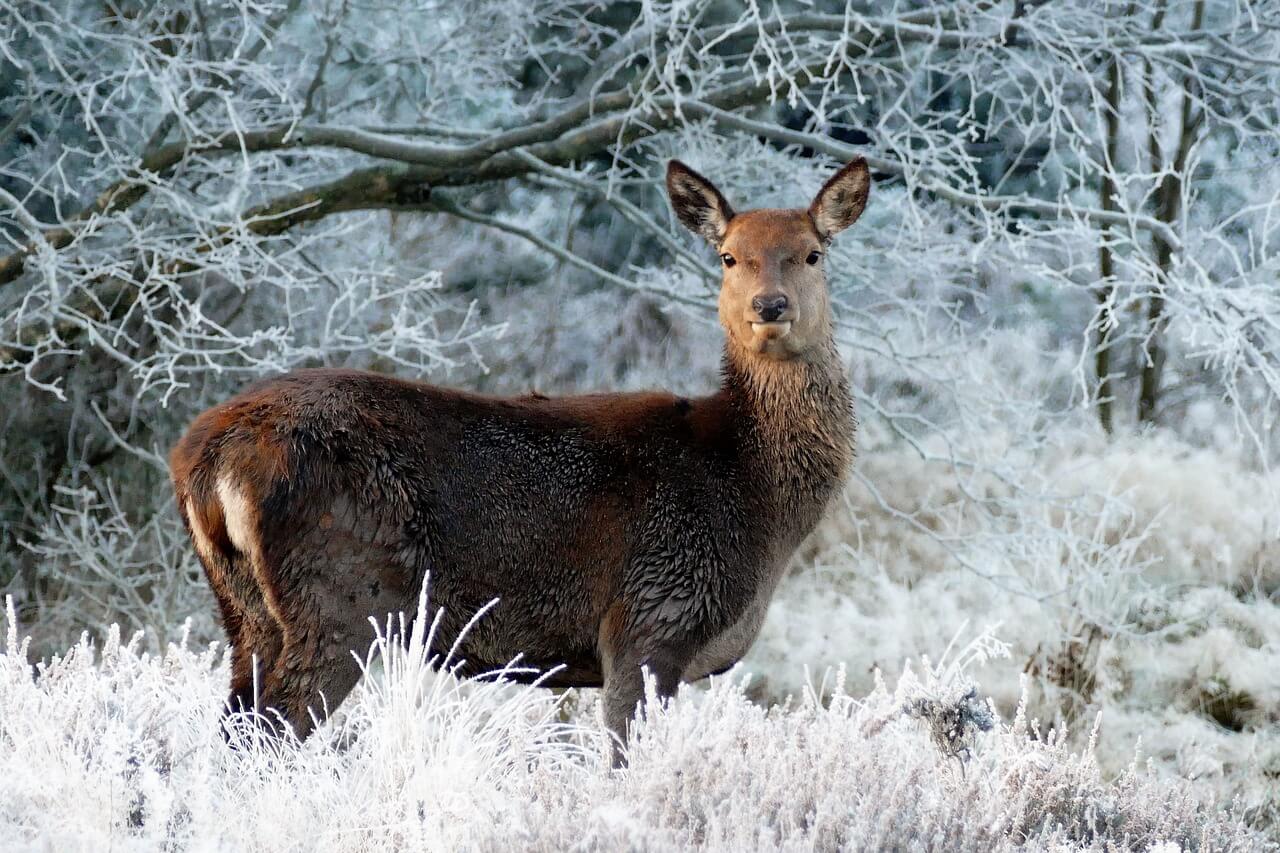The deer is a symbol of grace, humility, and purity. The deer represents the virtues of gentleness, kindness and patience in the Bible. It is also symbolic of Christ’s sacrifice for us, as it was a gift from God to Moses on Mount Sinai.
God gave Moses the deer on Mount Sinai as a sign that he would take his people out of Egypt and into the Promised Land. In this way, the deer can be seen as an emblem of Christ’s sacrifice on the cross in order to save mankind from its sins.
The deer is also symbolic of grace, humility and purity. The first time we see a deer in Scripture is when Jacob sees it run past him while he was working at Shechem (Genesis 35:1). It is not unusual for us to see animals running past us or even lying down next to us, but when we do, it usually means something special has happened or will happen soon.

Symbolism of Deer in The Bible
Even in Bible times, deer were game animals, and they were permitted in the Israelite diet because they chewed the cud and “divided the hoof.” They are admired for their agility and grace, even in difficult terrain, and when they sense danger, they are able to run swiftly. As the sole caretakers for fawns, they are gentle. In an arid environment like that of Israel, deer would have had to travel long distances to find water. Beautiful, graceful, swift, and sure-footed deer were often used by the writers of Scripture to portray personal and spiritual qualities.
THIRST
REPORT THIS AD
When David took his quill and wrote, “As a deer longs for flowing streams, so my soul longs for you, O God” (Ps 42:1), he presented a compelling picture of the natural desire humans have for God. That longing may be distracted or even badly derailed by our experiences in life, but it lies at the heart of what being created in God’s image truly means. The deer’s simple, single-minded desire to have its thirst quenched points to what ought to always be true in our relationship with God—that we long to be satisfied in him.

DEXTERITY
Second Samuel 22 and Psalm 18 both record a powerful song of deliverance by David in which he writes, “He makes my feet like those of a deer and gave me sure footing on high places” (2 Sam 22:34; Ps 18:33). Freedom, nimbleness, and sure-footedness combine in David’s simile of a deer in its natural mountain environment and remind us of the abundance of life that God has for us as we trust him. The Creator has fitted and designed his creatures for the places where they live. They thrive where other creatures can not survive. The parallel between the deer’s dexterity on high and hazardous terrain and our need for wise functioning in the equally dangerous “high places” of human society makes David’s picture an apt one. The prophet Habakkuk can find no better symbol in his own psalm: “The LORD Almighty is my strength. He makes my feet like those of a deer. He makes me walk on the mountains” (Hab 3:19). The agility of deer also makes them a fitting symbol for those who are healed by God: “those who are lame will leap like deer” (Isa 35:6). When God restores the land, such will be people’s joy that the best image the prophet could find to express it is lame people becoming as agile as deer.
The deer is one of the most mentioned animals in the Bible. From the Old Testament writers and cultures has a special attachment to the deer for specific reasons. For some it was its speed, for others it was its calving and still, some writers borrowed the grace and the beauty of the deer.
As one would expect, there are several symbols of the deer in the Bible. In this article, we should walk through together as we identify the most outstanding ones. The main interest is the spiritual significance of the deer and what the Bible authors meant. What does a deer symbolize in the Bible? Read on!
The Thirst And Hunger For The LORD

The hunger for the LORD can be expressed in different ways. In Psalm 42:1 the Sons of Korah bring out this desire for the LORD and his fullness through a verse of scripture. The Bible records:
“As a deer pants for flowing streams, so pants my soul for you, O God.”
The Psalmist connects the thirst and panting of the deer as it looks or pools of water to the spiritual thirst for the living God. This being a desert landscape, the panting of the deer is a symbol of desperation and wits end. Water is the life-saving grace that we all need to survive and enliven our souls.
Without the water, the deer will die. In the same manner, our souls also need the life-sustaining grace of the LORD. We are in a spiritual jungle and only God’s providence can save us.
A Symbol Of Cleanliness
When God set apart his people as his treasured possession, he gave them some rules and regulations by which they were to live by. Among the rules were those concerning food, what to eat and what not to eat.
There were some foods especially animals that the Israelites could freely eat without the fear of becoming ceremonially unclean. In Deuteronomy 14:4-5, the Bible reads:
“These are the animals you may eat: the ox, the sheep, the goat, the deer, the gazelle, the roe deer, the wild goat, the ibex, the antelope and the mountain sheep.”
The deer is therefore approved and set apart by the LORD as a clean animal that the children of Israel could eat and remain holy.
God’s Providence And Care
God is so intentional in our lives that even before we pray, he provides for us. There is so much that God does some of which often escapes our attention and memory.
While we always look at the big things in our lives, and the major events that we want God to come through for us, we tend to forget that he is the God of the entire universe, and he provides for each of his creations.
For instance, the LORD brings rain to both the godly and the ungodly. In one classic example involving the deer, the Bible demonstrates the sovereignty of God in providing for his creation. In Job 39:1 the Bible says:
“Do you know when the wild goats give birth? Have you watched as deer are born in the wild?”
God said this in response to Job who was complaining about what he was going through to the point of invoking God to obliterate the day he was born and forget it completely.
God reminds Job that there is so much that he cares for, things that Job probably didn’t know or had not thought through.
Natural Affection And Freedom
In the book of Genesis 49:21, the Bible describes Naphtali as a doe let loose that gives beautiful words. Naphtali is the state after temptation and the hind let loose symbolizes the natural affection and vibrancy of life.
Temptations have a way of binding the soul and confining it to a state of eternal capture. However, when deliverance comes and the spirit is set free, there is a sense of affection and natural behaviour that makes us as vibrant as a deer.
When you find a deer grazing or running around in the grassland, you’ll in doubt envy its state of freedom and expression. That is how it feels like when we are not under any chains or confinement the beauty within us flows out naturally.
God’s Establishment And Direction

In both Samuel and Psalm, the Bible speaks of God’s establishment and direction in connection to the deer. In 2 Samuel 22:34, the Bible reads:
“He makes my feet like the feet of a deer; he causes me to stand on the heights.”
It speaks of how God establishes his people in the territories he wants them to conquer.
The deer is built for the mountains and its foot structure is made in such a way that it can scale the ruggedness of the mountains with finesse.
God is on a mission to establish us and give us territorial dominance in our areas of operation. The deer does not have to look for another landscape rather it adapts to the existing landscape and makes its life worthwhile there.
In the book of Habakkuk 3:19, the Bible speaks of almost the same establishment through the minor prophet Habakkuk. It says:
“The Lord God is my strength, And He has made my feet like hinds’ feet, And makes me walk on my high places.”
The Desperate Inhabitants Of The Fallen Jerusalem
The book of Lamentations documents is such a graphical way the prophecies concerning the fall of Jerusalem to the hands of the Babylonians. It talks of how deserted the city that was once full of people and the desperation of those left behind.